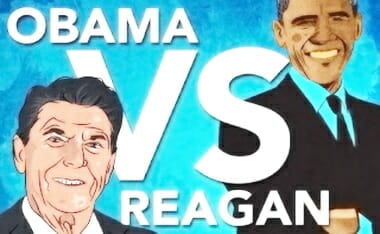(Click To Enlarge)
Margaret Thatcher


How Is Obama’s Economic Recession the Worst? Larry Elder Explains
Larry Elder weighs in with an older article from 2011: Economy: Reagan Gets No Credit, Obama Gets No Blame
Ronald Reagan did nothing. Barack Obama saved the nation from total collapse.
How else to explain the absence of jobless pitchfork-wielding Americans storming the White House? How else to explain the contrast between the explosive Reagan Recovery and the dud on our hands right now? Fortunately, the left is up to the task.
“The secret of the long climb after 1982 was the economic plunge that preceded it. By the end of 1982 the U.S. economy was deeply depressed, with the worst unemployment rate since the Great Depression. So there was plenty of room to grow before the economy returned to anything like full employment,” said left-wing economist, Nobel laureate and New York Times columnist Paul Krugman in 2004. Oh.
An economy that is “deeply depressed,” Krugman insists, or at least he did seven years ago, naturally comes back strong. To what principal factor did Krugman point to in calling the 1982 economy “deeply depressed”? Unemployment. It peaked in the early ’80s at 10.8 percent, even higher than during “The Great Recession” (aka the economy “inherited” by President Barack Obama). In 2010, the unemployment rate hit 10.2 percent, which means the early ’80s still holds the record for the “worst unemployment rate since the Great Depression.”
What most people care about are jobs. By that standard, Reagan faced an even tougher economy. Throw in a higher rate of inflation — 1980’s 13.5 percent average vs. 2011’s 2.6 percent — and much higher prime interest rates — 20 percent vs. 3.25 percent — and the early ’80s looked even grimmer than The Great Recession.
Krugman gives no credit to the Reagan policies of lower taxes, deregulation and a slowdown in the rate of government spending. He believes Reagan’s policies (SET ITAL) harmed (END ITAL) the economy. Krugman approvingly quotes Bill Clinton, who, as a presidential candidate, said: “The Reagan-Bush years have exalted private gain over public obligation, special interests over the common good, wealth and fame over work and family. The 1980s ushered in a Gilded Age of greed and selfishness, of irresponsibility and excess, and of neglect.”
Enter President Barack “Hope and Change” Obama, with a Democratic majority in the House and a supermajority filibuster-proof Senate. Out went policies like reductions in income taxes, corporate taxes, capital gains and dividends. In came transfers of money from one pocket to another to “spread the wealth.”
Under ObamaCare, the Democrats placed the entire health care system under the command and control of the federal government. Through a nearly $1 billion “stimulus” package, Democrats spent money on “shovel-ready” projects with a promise to “save or create” 3.5 million jobs. To rein in “greed” and to fight “climate change,” the Obama administration imposed billions of dollars’ worth of new regulations on businesses. Through “quantitative easting,” the Federal Reserve effectively printed money to keep interest rates low, a widely disputed policy designed to encourage banks to lend and businesses to borrow.
So where is it? When do we see the massive bounce-back from this “deeply depressed” economy, at minimum the kind of bounce-back that occurred in the ’80s in spite of the allegedly harmful policies of Reagan?
Krugman’s analysis of the Reagan recovery — a deep recession equals sharp recovery — tells us that the economy should be storming ahead, especially given Obama’s enlightened leadership. But in the seven quarters following the end of this recession, gross domestic product growth has averaged 2.8 percent. In the seven quarters following the Reagan recession, GDP growth averaged 7.1 percent.
(Below) The C.A.T.O. Institute has been proven correct in their warning!
`The Real Legacy of Margaret Thatcher, Britain’s Iron Lady` ~ Heritage Foundation
BREAKING: The Iron Lady, Margaret Thatcher, Passes
See NewsBusters story on this. Via SkyNews (Drudge)
…Britain’s Iron Lady, has died after suffering a stroke at the age of 87.
Her children Mark and Carol Thatcher announced that their mother had died peacefully following a stroke this morning.
Speaking to Sky News, spokesman and friend Lord Bell, who announced her death, said: “We’ll never see the like of her again. She was one of the great prime ministers of all time and transformed people’s lives.”
He described the former prime minister, a grocer’s daughter from Grantham, as the greatest leader of the Conservative Party with the exception of Winston Churchill.
[….]
Baroness Thatcher, Britain’s first and only woman prime minister, had become increasingly frail and was suffering ill health in recent years.
Liberal policies view lower income for the poor and the richer as a good thing as long as the gap is closer… our same struggle today. These brief exchanges took place during Margaret Thatcher’s last speech in the House of Commons on 22 November 1990. Read the complete transcript for this speech here.
She was admitted to hospital shortly before Christmas where she underwent an operation to remove a growth from her bladder but was allowed to return home before new year.
Prime minister between 1979 and 1990, she has been credited with transforming a nation in one decade, putting Britain back among the leading industrial nations of the world.
She became loved and loathed in equal measure as she crushed the unions and privatised vast swathes of British industry, as she led the Tories to three election victories.
Tough beyond measure, she was nicknamed the Iron Lady by a Russian journalist in 1976 for her opposition to Soviet communism. It is a moniker that stuck and was the title of a film in which Meryl Streep took the title role, which was released in 2011.
She was also memorably described by the then French president Francois Mitterrand with the back-handed compliment that she had the “eyes of Caligula and the mouth of Marilyn Monroe”.
Liberal Democrat leader Nick Clegg said: “Margaret Thatcher was one of the defining figures in modern British politics.
“Whatever side of the political debate you stand on, no-one can deny that as prime minister she left a unique and lasting imprint on the country she served.
“She may have divided opinion during her time in politics but everyone will be united today in acknowledging the strength of her personality and the radicalism of her politics.”
Despite her toughness, few will forget the pictures of Baroness Thatcher leaving Downing Street for the last time with her husband, Sir Denis, and tears in her eyes.
